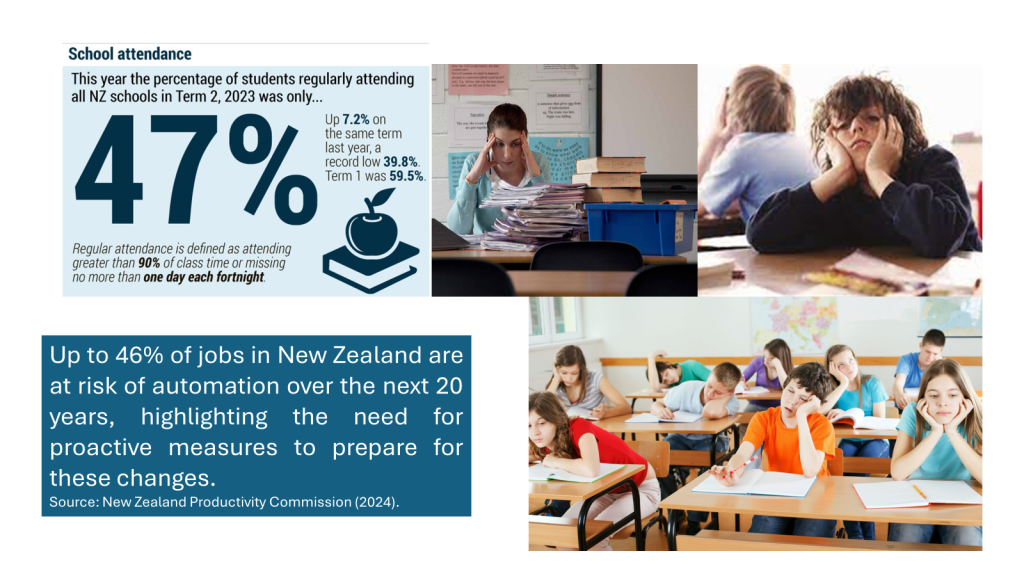
The New Zealand Tech Alliance is a group of independent technology associations from across New Zealand that work together to ensure a strong voice for technology.
Visit Tech Alliance

The New Zealand Tech Alliance is a group of independent technology associations from across New Zealand that work together to ensure a strong voice for technology.
Visit Tech Alliance
Susana Tomaz: STEAM Coordinator and Across School Lead for the Te Kāhui Ako o Pupuke, Westlake Girls High School

New Zealand’s education system is facing significant challenges, from declining performance in key areas like science and mathematics to persistent inequities that threaten to undermine the nation’s economic potential.
As highlighted in the recent OECD Economic Surveys: New Zealand 2024, these issues are compounded by an education policy framework that struggles to keep pace with modern demands, particularly in leveraging technology to enhance learning outcomes. The report recommends:
On 29 April, Education Minister, Erica Stanford outlined the Government’s six education priorities focused on lifting achievement:
Could AI bring about the paradigm shift we need in our Education System?
The OECD Economic Surveys: New Zealand 2024 recognised New Zealand’s highly talented and motivated teaching professionals, as being let down by a system performing below its potential. With significant deficiencies, including an overly reduced operational capacity of the Ministry of Education.
The decline in New Zealand Schools’ education performance and persistent inequities that we are experiencing, could threaten New Zealand’s prosperity. Education is crucial for raising human capital, which drives economic growth. OECD research found a correlation between declining average country scores in the OECD’s PISA tests of student achievement and long-term reductions in aggregate productivity. The OECD Economic Survey of New Zealand 2022 found that weak learning outcomes in science and mathematics are already constraining the economy’s capacity to grow and create jobs through digitalisation.
The OECD Economic Surveys: New Zealand 2024 advocates for a major overhaul of the education policy framework for New Zealand schools. However, failing to incorporate AI into an education framework overhaul poses a significant risk of exacerbating the digital divide, as well as, missing out on opportunities for dynamic, tailored learning facilitated by technologies like generative AI, augmented reality, and game-based learning. Students from disadvantaged backgrounds or underserved regions may be left further behind if they lack access to AI-powered educational tools and personalised learning experiences. Teachers may not receive adequate training on leveraging AI for instruction, limiting their ability to provide equitable, technology-enhanced learning opportunities for all students.
The NZ AI Landscape in Secondary Schools
Through my Master’s research, I am exploring the opportunity an education framework overhaul presents to integrate AI responsibly into the New Zealand education system to leverage emerging technologies, such as AI, to support the development of effective practices that enhance learning outcomes in science and mathematics through a STEAM pedagogical approach.
As part of this research a survey was conducted between 1 May and 25 May 2024, and Senior School Leaders, Middle leaders/Unit holders, and classroom teachers were invited to participate.
A total of 99 responses were analysed providing clarity on the current landscape of AI integration within secondary schools in New Zealand. The survey highlighted that the adoption of Artificial Intelligence (AI) in New Zealand secondary schools is progressing at a very slow pace, revealing a critical challenge: a marked lack of awareness among educators and school leaders regarding the Generative AI Guidelines issued by the Ministry of Education.
This knowledge gap exposed a broader issue of inconsistent application and standardisation of AI technologies in schools, which poses a risk of exacerbating existing inequalities and widening the digital divide. Furthermore, the survey indicated strong support among participants for the development of an AI framework. Professional development in AI literacy was identified as a major enabler. This presents a great opportunity for EdTech to collaborate with educators.
It is worth noting that recently, the Ministry of Education has adopted the ST4S (Security and Privacy in Software for Schools), a program that provides schools and kura with detailed reports on the privacy and security compliance of digital products, helping them make informed decisions about their software choices based on assessed risk levels. ST4S is managed by Education Services Australia (ESA) on behalf of participating education jurisdictions including the NZ Ministry of Education.
It is encouraging to see some movement in the right direction by large institutions such as UNESCO. The UNESCO International Forum on the Futures of Education 2024, focusing on “Renewing Education to Transform the Future,” will be held in Suwon, Gyeonggido, Republic of Korea, from 2 December to 4 December 2024, from 8:00am to 8:00 pm.

If you would like to find out more about my Master’s project and be involved, please contact me through a LinkedIn message or email.
References:
Gander, T., & Shaw, B. (2024). AI in education 2023: Understanding the impact on effective pedagogy, inclusive learning, and equitable outcomes. He Rourou, 1(1), 15-30. https://doi.org/10.54474/herourou.v1i1.9137
OECD Economic Surveys: New Zealand 2024
OECD-Education International (2023)
OECD Education and Skills Today (2023)
Barro, R. J. (2001). Human Capital and Growth. American Economic Review.
Egert, B. et al. (2023). The Impact of PISA Performance on Economic Growth. OECD Publishing.